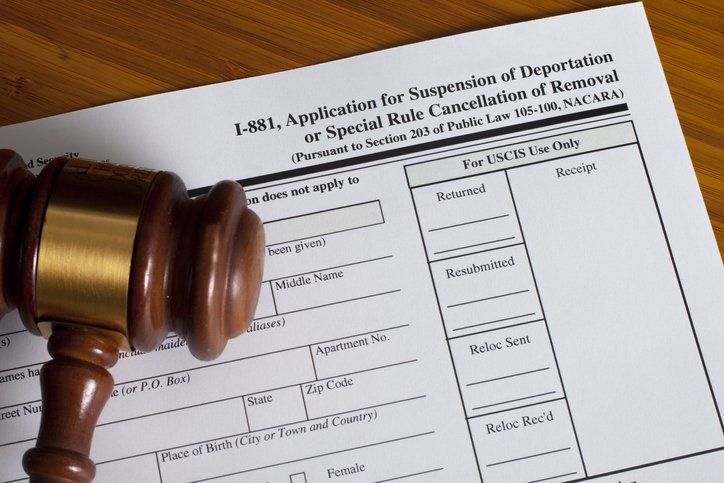Immigrant Removal Defense Lawyer Serving Houston, TX
Under U.S. immigration law, an individual who is identified as being present in the United States illegally is generally subject to deportation by Immigration and Customs Enforcement (ICE). Every individual, regardless of status, has rights in immigration removal proceedings and may be entitled to certain defenses in Immigration Court.
Garza & Associates
litigation team ensures that your rights are protected and that all available relief from deportation is explored and properly presented. Our firm provides experienced litigation services to assist you in deportation and removal proceedings in Immigration Court. Our experienced attorneys will represent you at every stage of the deportation proceedings, including bond hearings and removal hearings.
Don’t fight the government alone!
RELEASE ON BOND
If your loved one has been detained by ICE, he or she may be eligible for release on bond. Our experienced attorneys can assist you in obtaining a bond hearing before the Immigration Court. For the individual to be released, he or she must demonstrate that such release would not pose a danger to property or persons, and that the detainee is likely to appear for any future hearings.
The factors generally considered by the Immigration Judge in making the decision to set bond or release the individual are as follows:
- Local family ties
- Financial ability to post bond
- Manner of entry and length of time in the United States
- Prior arrests, convictions, appearances at hearings
- Membership in community organizations
- Immoral acts or participation in subversive activities
- Mandatory detention
Unfortunately, due to strict provisions in the Immigration & Nationality Act, not all individuals who are in ICE custody are eligible for a bond. Mandatory detention refers to a provision of immigration law that states that non-citizens with certain criminal convictions or who are classified as arriving aliens are not entitled to a bond hearing and must remain in detention while removal proceedings are pending against them. These individuals are still eligible to defend themselves while detained to stop their deportation. Our litigation team is highly experienced in bond proceedings and can advise you about your rights in detention and an appropriate defense.
Adjustment of Status
Adjustment of status is a way of changing from undocumented status or nonimmigrant status to Lawful Permanent Resident status or “green card holder.” Adjustment of status is available to individuals who have a qualifying immigration petition through their family member or their employer. Adjustment of status is available to individuals who entered the United States legally as well as illegally under certain circumstances.
WAIVERS OF INADMISSIBILITY AND REMOVABILITY
A Lawful Permanent Resident or an undocumented non-citizen who is seeking admission to the United States but who has violated certain immigration laws or has been convicted of certain criminal offenses may apply for a waiver of inadmissibility. Lawful Permanent Residents and admitted non-immigrants are eligible for waivers of removability. All the waivers available require that the applicant establish hardship to himself or to his close family members if he were to be removed from the United States.
For example, a person involved in removal proceedings for certain criminal grounds may be eligible for a waiver under §212(h) if the failure to admit him to the United States would result in “extreme hardship” to his LPR or USC spouse, parent(s), son(s) or daughter(s). Similarly, a person who has committed fraud or a material misrepresentation may apply for a waiver under §212(i) if his deportation from the United States would result in “extreme hardship” to his lawful permanent resident (LPR) or U.S. citizen (USC) spouse or parents.
CANCELLATION OF REMOVAL
Cancellation of Removal for Non-Permanent Residents:
Undocumented non-citizens who have been physically present in the United States for at least ten years prior to the initiation of removal proceedings or the committing of certain offenses are eligible to have their removal canceled by the Immigration Judge and become Lawful Permanent Residents if they meet specific requirements:
- Must be a person of good moral character for ten years;
- Must not be inadmissible for certain criminal offenses and security grounds;
- Must prove exceptional and extremely unusual hardship to a qualifying U.S. citizen or lawful permanent resident spouse, parent or child.
Cancellation of Removal for Permanent Residents
Cancellation Removal has the effect of “pardoning” or “forgiving” the Lawful Permanent Resident’s deportability. Only certain grounds of deportability may be waived by a grant of the Cancellation of Removal. The Immigration Judge will balance certain positive factors against negative factors in determining whether the LPR should be permitted to remain in the United States. In the case of Permanent Residents, a granted application will have the effect of allowing the lawful permanent resident to maintain his status and remain in the United States. An Immigration Judge will consider such factors as family ties, history of employment, community service, long residency in the United States, property and assets, criminal record, immigration violations, and rehabilitation and remorse.
Lawful Permanent Residents are eligible for this relief if they have been Lawful Permanent Residents for a minimum of five years and meet certain requirements:
- Have resided continuously in the United States for a minimum of seven years after being admitted to the United States in any status (prior to the institution of removal proceedings or the committing of certain offenses);
- Have not been convicted of an aggravated felony;
- Are not inadmissible from the United States on security grounds.
ASYLUM
This is a form of protection for people who have fled persecution or fear future persecution in their home country. Those who have a well-founded fear of persecution if they return to their home country may apply for asylum if their fear of persecution is based on any of the following grounds:
- Political opinion
- Religious belief
- Nationality
- Race
- Membership in a particular social group
If a person is granted asylum, after one year they may apply for permanent resident status.
WITHHOLDING OF REMOVAL
Withholding of removal is similar to asylum, but applicants must show that it is “more likely than not” that they would be persecuted in their home country upon return. A person who is granted withholding can stay in the United States and can get work authorization. However, recipients are usually ineligible to apply for permanent residence or travel outside of the United States.
VIOLENCE AGAINST WOMEN ACT (VAWA)
VAWA stands for “Violence Against Women Act” and it is a law that allows abused spouses, children, and parents to self-petition to gain permanent resident status without the knowledge of the U.S. citizen or permanent resident abuser. VAWA provisions apply to both men and women equally and it can also protect parents and children from the abuser.
Protection for spouses:
You can file for yourself if you are, or were, the abused spouse of a U.S. citizen or permanent resident. You are also able file as an abused spouse if your child has been abused by your U.S. citizen or permanent resident spouse. You can also include your unmarried children who are under 21 in your petition.
Protection for parents:
You may file if you are the parent of a U.S. citizen, and you have been abused by your U.S. citizen son or daughter.
Protection for children:
You may file for yourself if you are an abused child under 21, unmarried and have been abused by your U.S. citizen or permanent resident parent. Your children may also be included on your petition. You may also file for yourself as a child after age 21 but before age 25 if you can demonstrate that the abuse was the main reason for the delay in filing.
APPEALS
Every application for relief from deportation is decided at the discretion of the Immigration Judge. If you disagree with the Immigration Judge’s decision in your case or on your bond, you have the right to appeal the judge’s decision to a higher court. This court is called the Board of Immigration Appeals (BIA). The BIA decides all appeals from Immigration Courts around the country.
Contact us today and let us evaluate your case.
At the end of your Immigration Court hearing, the judge will make a final decision about your case and will ask if you want to appeal the decision. It is very important to reserve your right to appeal. When you reserve your right to appeal, you are automatically given 30 days to file your Notice of Appeal. The BIA will then set deadlines for filing of the brief.


